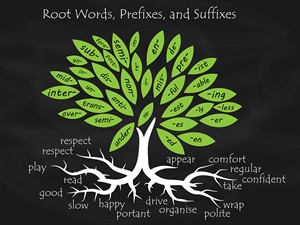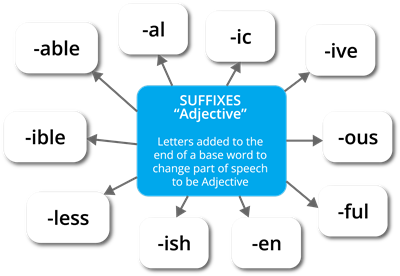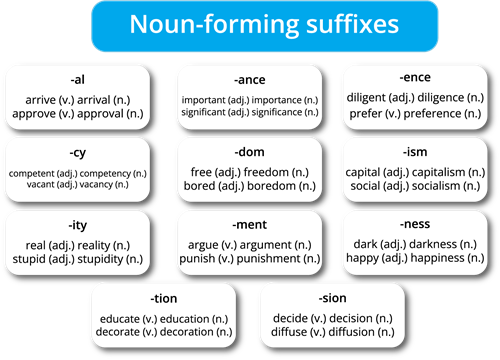The Magic of Word Building

Learn: every word in English has a secret power waiting to be unlocked. With just a few letters added at the beginning or end, one idea can grow, twist, or transform into many new meanings. Learning prefixes and suffixes is like holding a key to the English language – it helps you understand new words without using a dictionary, express yourself more precisely, and recognise patterns that make English logical. Once you start noticing them, you’ll see them everywhere – in songs, textbooks, movies, and conversations – turning ordinary reading into a treasure hunt for meaning. Now, let's watch an introductory video to understand what exactly a prefix and a suffix are.
Key Takeaways:
Prefixes change meaning (e.g. un-happy = not happy),
Suffixes change part of speech (e.g. happy (adjective) — happily (adverb) — happiness (noun)).
A prefix is added to the beginning of a word.
A suffix is added to the end of a word.
Suffixes change part of speech (e.g. happy (adjective) — happily (adverb) — happiness (noun)).
A prefix is added to the beginning of a word.
A suffix is added to the end of a word.
Here are some prefixes mentioned in the video:
re- — means "again" (redo = do again)
un- — means "opposite / reverse" (undo = reverse an action)
dis- — means not / opposite (disagree, dislike, disappear)
re- — means "again" (redo = do again)
un- — means "opposite / reverse" (undo = reverse an action)
dis- — means not / opposite (disagree, dislike, disappear)
Here is a suffix mentioned in the video:
Adding -ness changes adjectives into nouns
happy — happiness
sad — sadness
tired — tiredness
Adding -ness changes adjectives into nouns
happy — happiness
sad — sadness
tired — tiredness
Learn: now, let's continue by exploring suffixes in detail. As you already know, a suffix is a group of letters added to the end of a root word to change its meaning or its part of speech. What exactly is a root word?
A root word is the main part of a word that carries the core meaning.
When we add prefixes or suffixes, the root stays the same and gives the word its basic sense.
When we add prefixes or suffixes, the root stays the same and gives the word its basic sense.
Take a look at this example:
unforgivable
un- — a prefix
forgive — root word
-able — a suffix
Now, let's explore suffixes in detail. Study the image.

Let’s take a look at these suffixes we use to form adjectives and describe what something or someone is like in detail.
–able / –ible
Meaning: “can be done” or “possible to”
Used: to form adjectives from verbs
Examples:
comfort (root word) + -able = comfortable — can be comforted, gives comfort
read (root word) + -able = readable — can be read
Meaning: “can be done” or “possible to”
Used: to form adjectives from verbs
Examples:
comfort (root word) + -able = comfortable — can be comforted, gives comfort
read (root word) + -able = readable — can be read
–al
Meaning: “related to” or “connected with”
Used: to form adjectives from nouns
Examples:
culture (root word) + -al = cultural — related to culture
person (root word) + -al = personal — connected with a person
environment (root word) + -al = environmental — related to the environment
Meaning: “related to” or “connected with”
Used: to form adjectives from nouns
Examples:
culture (root word) + -al = cultural — related to culture
person (root word) + -al = personal — connected with a person
environment (root word) + -al = environmental — related to the environment
–ic
Meaning: “having the quality of” or “related to”
Used: to form adjectives from nouns
Examples:
history (root word) + -ic = historic — related to history
science (root word) + -ic = scientific — about science
economy (root word) + -ic = economic — connected with economy
Meaning: “having the quality of” or “related to”
Used: to form adjectives from nouns
Examples:
history (root word) + -ic = historic — related to history
science (root word) + -ic = scientific — about science
economy (root word) + -ic = economic — connected with economy
–ive
Meaning: “having a tendency to” or “doing something naturally”
Used: to form adjectives from verbs
Examples:
create (root word) + -ive = creative — tends to create
talk (root word) + -ive = talkative — tends to talk
attract (root word) + -ive = attractive — draws attention
Meaning: “having a tendency to” or “doing something naturally”
Used: to form adjectives from verbs
Examples:
create (root word) + -ive = creative — tends to create
talk (root word) + -ive = talkative — tends to talk
attract (root word) + -ive = attractive — draws attention
–ous
Meaning: “full of” or “having the quality of”
Used: to form adjectives from nouns
Examples:
danger (root word) + -ous = dangerous — full of danger
fame (root word) + -ous = famous — having fame
Meaning: “full of” or “having the quality of”
Used: to form adjectives from nouns
Examples:
danger (root word) + -ous = dangerous — full of danger
fame (root word) + -ous = famous — having fame
–ful
Meaning: “full of” or “showing”
Used: to form adjectives from nouns
Examples:
beauty (root word) + -ful = beautiful — full of beauty
help (root word) + -ful = helpful — showing help
hope (root word) + -ful = hopeful — full of hope
Tip: the opposite is -less
Meaning: “full of” or “showing”
Used: to form adjectives from nouns
Examples:
beauty (root word) + -ful = beautiful — full of beauty
help (root word) + -ful = helpful — showing help
hope (root word) + -ful = hopeful — full of hope
Tip: the opposite is -less
–less
Meaning: “without” or “lacking”
Used: to form adjectives from nouns
Examples:
hope (root word) + -less = hopeless — without hope
care (root word) + -less = careless — without care
fear (root word) + -less = fearless — without fear
Tip: imagine taking the noun away: “no hope,” “no care,” "no fear"
Meaning: “without” or “lacking”
Used: to form adjectives from nouns
Examples:
hope (root word) + -less = hopeless — without hope
care (root word) + -less = careless — without care
fear (root word) + -less = fearless — without fear
Tip: imagine taking the noun away: “no hope,” “no care,” "no fear"
–ish
Meaning: “somewhat,” “like,” or “around that quality”
Used: to form adjectives from nouns or adjectives
Examples:
child (root word) + -ish = childish — like a child (in a negative way)
green (root word) + -ish = greenish — somewhat green
fool (root word) + -ish = foolish — like a fool
Tip: -ish makes things less exact — “kind of like”
Meaning: “somewhat,” “like,” or “around that quality”
Used: to form adjectives from nouns or adjectives
Examples:
child (root word) + -ish = childish — like a child (in a negative way)
green (root word) + -ish = greenish — somewhat green
fool (root word) + -ish = foolish — like a fool
Tip: -ish makes things less exact — “kind of like”
–en
Meaning: “made of” or “to become”
Used: to form adjectives from nouns
Examples:
gold (root word) + -en = golden — made of gold
wood (root word) + -en = wooden — made of wood
Tip: if it’s made of a material, use the suffix –en
Meaning: “made of” or “to become”
Used: to form adjectives from nouns
Examples:
gold (root word) + -en = golden — made of gold
wood (root word) + -en = wooden — made of wood
Tip: if it’s made of a material, use the suffix –en
Learn: suffixes can be added to form not only adjectives. This way we can form nouns as well. Let's explore in detail.

A noun names a person, place, thing, or idea.
When we add these suffixes, we often change a verb or adjective into a noun.
When we add these suffixes, we often change a verb or adjective into a noun.
–al
Meaning: the act, process, or result of something
Used: to form nouns from verbs
Examples:
Meaning: the act, process, or result of something
Used: to form nouns from verbs
Examples:
approve (root word) + -al = approval
arrive (root word) + -al = arrival
–ance / –ence
Meaning: state, quality, or process
Used: to form nouns from verbs or adjectives
Examples:
Meaning: state, quality, or process
Used: to form nouns from verbs or adjectives
Examples:
import (root word) + -ance = importance (a state of being important)
prefer (root word) + -ence = preference (an act of preferring)
prefer (root word) + -ence = preference (an act of preferring)
–cy
Meaning: state or quality of being
Used: to form nouns from adjectives
Examples:
Meaning: state or quality of being
Used: to form nouns from adjectives
Examples:
competent (root word) + -cy = competency
vacant (root word) + -cy = vacancy
Tip: use it when you describe a condition or quality (vacant — vacancy = empty space)
Tip: use it when you describe a condition or quality (vacant — vacancy = empty space)
–dom
Meaning: state, condition, or area of control
Used: to form nouns from adjectives or nouns
Meaning: state, condition, or area of control
Used: to form nouns from adjectives or nouns
Examples:
free (root word) + -dom = freedom
king (root word) + -dom = kingdom
Tip: often used for feelings or areas (e.g. freedom = state of being free)
Tip: often used for feelings or areas (e.g. freedom = state of being free)
–ism
Meaning: belief, system, or behaviour
Used: to form nouns from nouns or adjectives
Examples:
Meaning: belief, system, or behaviour
Used: to form nouns from nouns or adjectives
Examples:
capital (root word) + -ism = capitalism
social (root word) + -ism = socialism
race (root word) + -ism = racism
tour (root word) + -ism = tourism
Tip: use it for ideas, movements, or philosophies
Tip: use it for ideas, movements, or philosophies
–ity
Meaning: state, quality, or condition
Used: to form nouns from adjectives
Examples:
Meaning: state, quality, or condition
Used: to form nouns from adjectives
Examples:
real (root word) + -ity = reality
stupid (root word) + -ity = stupidity
active (root word) + -ity = activity
Tip: if the adjective ends in –ic or –al, it often changes to –ity (electric — electricity)
Tip: if the adjective ends in –ic or –al, it often changes to –ity (electric — electricity)
–ment
Meaning: action, process, or result
Used: to form nouns from verbs
Examples:
Meaning: action, process, or result
Used: to form nouns from verbs
Examples:
argue (root word) + -ment = argument
punish (root word) + -ment = punishment
develop (root word) + -ment = development
Tip: think of –ment as the “thing that happens” after a verb
Tip: think of –ment as the “thing that happens” after a verb
–ness
Meaning: state, quality, or feeling
Used: to form nouns from adjectives
Examples:
Meaning: state, quality, or feeling
Used: to form nouns from adjectives
Examples:
dark (root word) + -ness = darkness
happy (root word) + -ness = happiness
kind (root word) + -ness = kindness
Tip: –ness often turns an emotion or quality into an abstract noun (kind — kindness)
Tip: –ness often turns an emotion or quality into an abstract noun (kind — kindness)
–tion / –sion
Meaning: the act, process, or result
Used: to form nouns from verbs
Examples:
Meaning: the act, process, or result
Used: to form nouns from verbs
Examples:
educate (root word) + -tion = education
decide (root word) + -sion = decision
Tip:
If the verb ends with –ate, use –tion (decorate — decoration).
If the verb ends with –d, –de, or –se, use –sion (decide — decision)
If the verb ends with –ate, use –tion (decorate — decoration).
If the verb ends with –d, –de, or –se, use –sion (decide — decision)
Learn: now it is time to explore prefixes. Watch the video.
Key Takeaways:
Prefixes and their meanings
Prefixes and their meanings
un- — opposite (happy — unhappy)
over- — too much (spend — overspend, sleep — oversleep)
pre- — before (predict, prepaid, preheat)
post- — after (postgraduate, postwar, posthumous)
multi- — many (multicultural, multimillionaire, multiply)
mono- — one (monologue, monopolize, monotheistic)
bi- — two (bicycle, bilingual)
under- — too little (undercooked, underrepresented, underestimate)
super- — extra, extreme (supermodel, supercomputer, superfluous)
mis- — wrong, badly (misunderstand, misbehave, misplace)
anti- — against, opposite (antisocial, anti-aging, anticlimactic)
How to Know What Part of Speech You Need
Nouns
Come after articles (a, an, the) — a habit, the improvement
Can follow adjectives — a balanced diet
Often used as subjects or objects — Exercise is important.
Adjectives
Come before nouns — healthy food, harmful habit
Come after verbs like "be", "seem", "feel" — She is tired.
Often used after "very" / "too" / "quite" — very positive attitude
Verbs
Come after “to” — to relax, to exercise
Can follow a subject directly — He eats well.
Change form for tense — works / worked / is working
Adverbs
Tell how something happens — She eats healthily.
Often come after verbs — He sleeps well.
Usually end in -ly — quickly, carefully, regularly
Nouns
Come after articles (a, an, the) — a habit, the improvement
Can follow adjectives — a balanced diet
Often used as subjects or objects — Exercise is important.
Adjectives
Come before nouns — healthy food, harmful habit
Come after verbs like "be", "seem", "feel" — She is tired.
Often used after "very" / "too" / "quite" — very positive attitude
Verbs
Come after “to” — to relax, to exercise
Can follow a subject directly — He eats well.
Change form for tense — works / worked / is working
Adverbs
Tell how something happens — She eats healthily.
Often come after verbs — He sleeps well.
Usually end in -ly — quickly, carefully, regularly
Final tip: how to remember prefixes and suffixes
1. Don’t try to memorise every prefix and suffix at once — notice them in action.
2. Each time you meet a new word, look for its parts: the prefix, the root, and the suffix. Ask yourself: “What happens to the meaning when I add this ending or beginning?”
1. Don’t try to memorise every prefix and suffix at once — notice them in action.
2. Each time you meet a new word, look for its parts: the prefix, the root, and the suffix. Ask yourself: “What happens to the meaning when I add this ending or beginning?”
3. Such way, soon you’ll start recognising patterns — and that’s how prefixes and suffixes become your secret code for unlocking hundreds of new words.
Atsauce:
English with Cambridge “Prefixes and Suffixes | English Language Learning Tips | Cambridge English” on youtube.com
Espresso English “10 Common Prefixes You NEED To Know” on youtube.com